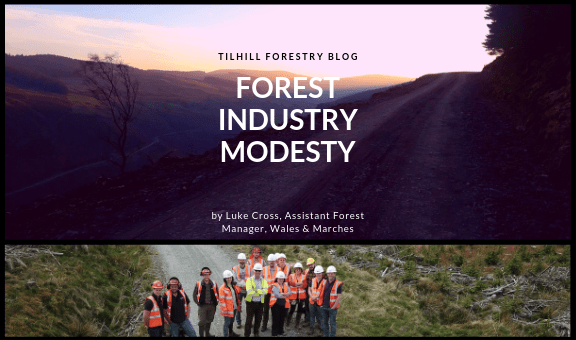Hello all, my name is Luke Cross and this is my second blog in a series I am putting together about all things forestry from the perspective of a newly appointed Assistant Forest Manager (AFM).
For those that didn’t catch the last blog I work in the North Wales office and have been in post for just over a year (a year and a week at the time of writing this blog to be exact!). The last blog covered my long and convoluted entry into the forest industry which revolved around one simple phone call.
This blog will look at a slightly different topic; my Tilhill Forestry colleagues within the North Wales office, their experience and their modesty and the modesty of the industry in general.
The office is a lovely old estate office building just outside of Bala. A very unassuming building you would pass and not think much about, even with the newly painted woodwork! There are three Senior Forest Managers (SFMs), two Forest Managers (FMs) and two Assistant Forest Managers AFMs based here, and of course there are the harvesting guys too!
I could do some maths to detail how much combined experience this would equate to, but I think it might offend the older members of the team! (i.e. my line manager John Ferguson with over 40 years’ experience). All this experience means there isn’t much about trees they don’t know, which is a perfect environment for me to continue my journey and absorb as much knowledge as I can from these guys.
The team cover approximately 49,400 acres of forestry, this works out to be approximately 20,000 football fields worth of trees with over 1 million trees being planted annually in North Wales. That’s something to brag about! And it doesn’t stop there.
The area of woodland we manage are enjoyed by thousands of people annually, provide habitats for wildlife, lock up carbon, filter air and water, decrease flooding events, provide the vistas we all love, as well as provide a renewable building material, food and clothing. These areas truly are a sustainable working environment. Alongside the environmental benefits our forests and woodlands provide, they also create jobs in rural areas, providing a high economic return. As foresters, we know these are all things we should be incredibly proud of and shout about. We should not underestimate our contribution as an industry to combat global warming either directly through carbon sequestration or indirectly through replacement goods and services.
These areas are managed and, in some cases, planted by these foresters. This has led to the forestry industry increasing forest cover in the UK from 5% at the turn of the century to 13% today which is still well behind the EU average of over 30%. The team’s wealth of experience has guided these forests through vandalism, fires, pest and diseases and high winds to ensure these areas still provide all the benefits I have already mentioned for people and nature to enjoy. Most importantly, these guys do it because they are passionate about their jobs, they love trees, they love forests and they love the landscapes whilst doing it all with modesty.
This passion is most evident at industry training events which are a great excuse for foresters to talk forestry, that’s all we talk about! However, we don’t tend to let the rest of the world gain too much of an insight into what ‘the day job’ involves. I still get confused looks from my family when I explain how my day has been, you almost have to simplify it to ‘I’m a farmer of trees’.
With all the good the industry does, this really shouldn’t be the case. I would love a world which embraces forestry as forestry, not just the individual trees but an understanding of the processes to achieve all the good things we do and for people to know how very rewarding, enjoyable and interesting of the industry is.
We as an industry need to do more to get all the good things we do recognised, the extra steps we take to accredit forests, landscaping forests to improve biodiversity, protecting habitats, increasing and improving public access and constantly self-reflecting to improve our own, already excellent, environmental performance.
Our biggest issue is no one sees the extra mile we go for the trees that are growing but it’s very obvious when harvesting is taking place to make way for the next generation of trees. No industry is perfect but not every industry is based in areas people go to escape! The onus is on us to assure people we know what we’re doing, we’re professional and doing what we can to make the world a more sustainable place!
Therefore, I have taken this blog as an opportunity to thank the forest industry for playing their part in a more sustainable future. I am incredibly proud to be a part of this industry and although we work for our clients – we all live for forestry.



